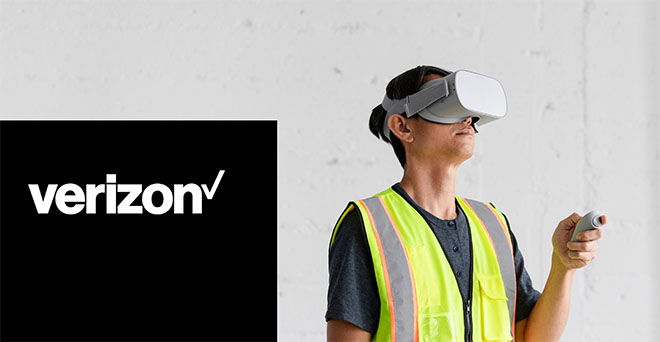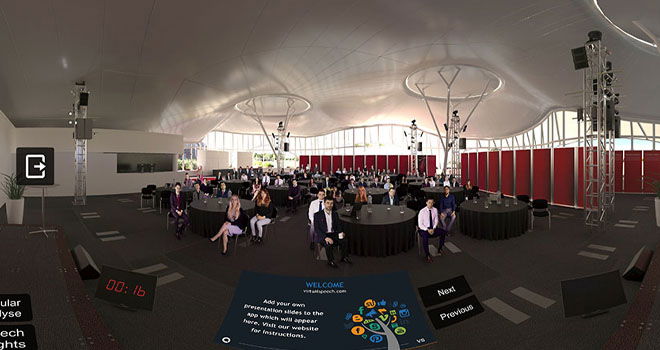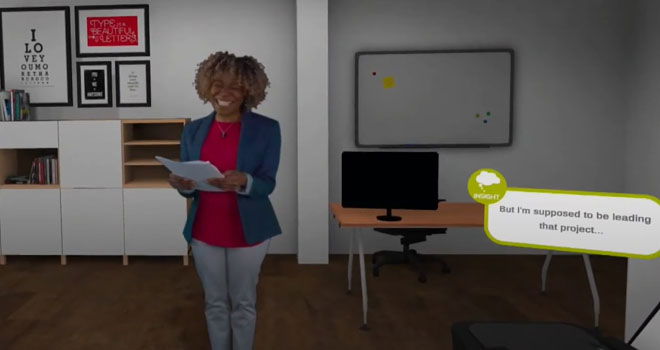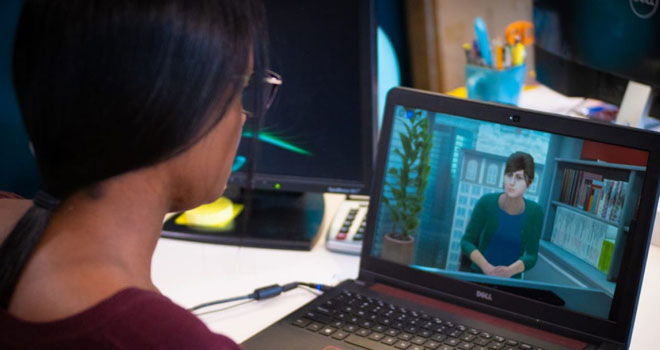
SOPHIE THOMPSON
In an increasingly automated world, it's the skills that make us uniquely human that are becoming ever-more important. Amongst others, these skills include communication, social skills, teamwork and leadership traits - otherwise collectively known as 'soft skills'. Or, as Josh Bersin, has suggested calling them: power skills.Soft skills have historically been difficult to train people in for a number of reasons, including the difficulty in quantifying progress, the need for repeated effort, and the false narrative that soft skills cannot be taught. Because soft skills are often shaped by someone's habits and life experiences, it takes commitment and consistent effort to lead to real behavioral change.Just like any other skill, practice makes perfect and immersive learning is opening up new opportunities to practice soft skills and develop confidence and skills in a short period of time.Immersive learning provides an easily accessible opportunity to practice communication skills on-demand. Here's our pick of 5 of the best uses of VR for soft skills training.
Talespin - Leading Through Uncertainty

This VR learning series focuses on empowering modern leaders to tackle workplace challenges and business disruptions, such as a global pandemic.The 5-part learning series, 'Leading Through Uncertainty,' provides business managers with opportunities to better understand and apply fundamental communication and interpersonal skills.The modules within the platform are based within a fictional company undergoing dramatic change. Using immersive conversations, learners are tasked with applying their knowledge to likely scenarios that can arise from a global health crisis,such as decreased morale, uncertainty, and finances within an organisation.The learner must then use their new-found skills to demonstrate how they would use emotionally intelligent leadership to support their team.Being able to put their new learning into action using VR enables leaders to gain greater confidence and commitment to apply their skills in the 'real world'.The immersive scenarios in this training enable learners to demonstrate and practice a range of skills, including:
- Other-awareness
- Active listening
- Empathy
- Speaking succinctly
- Psychological safety
- Problem solving
- Purposeful inquiry
- Productive disagreement
Strivr: customer service with Verizon

This customer service training was designed for Verizon to help its call centre team better manage disaffected and aggressive callers. The power skills it focuses on during the VR training include:
- Creating empathy
- De-escalating emotionally-charged calls
- Conflict resolution
Using immersive virtual scenarios enabled the company to measure and analyse the verbal fluency of its staff in the handling of difficult situations. Being able to measure trainees' comfort and stress levels also provided a valuable basis on which to build their ability to deal with unhappy customers.Results from the collaboration show that after three cycles of using the immersive training software, trainees showed substantial improvements in both their calmness and verbal fluency, which will ultimately reflect in their real-world conversations with customers and customer satisfaction.
VirtualSpeech: presentation skills with Vodafone

An essential part of training is measurable positive outcomes. In this example, VirtualSpeech provided a VR public speaking example which utilises AI for quantifiable feedback to measure and track learner performance.Vodafone's aim with training partner, VirtualSpeech, was to provide effective presentations skills training for their employees and make the training effective, engaging and memorable.The brief was to recreate The Pavilion - a training facility many employees were familiar with and therefore providing a realistic practice scenario for them to perfect their communication skills. Learners would also have access to VirtualSpeech's off-the-shelf public speaking VR content, which provides speaking training and additional VR environments to practice and learn in.An important element of the project was to provide insightful feedback on learner progress; quantitatively and qualitatively, and to be able to demonstrate the ROI of VR for soft skills training.Features used by VirtualSpeech to provide such feedback include real-time and post-performance speech analysis on attributes such as eye contact, pace, volume, tone, use of hesitation words, and listenability. Learners were also able to upload their own slides, notes and custom questions into the VR experience for the most effective practice available.The successful outcomes included:
- Strong employee satisfaction, leading to 91% of learners keen to benefit from more VR training.
- Design success, meaning 93% of employees reported they would recommend VirtualSpeech to a colleague.
- VR soft skills app usage levels showing employees are engaging well – especially in the Pavilion room, and VirtualSpeech's VR meeting and presentation rooms.
- The ability to identify skill gaps or employees' needs to further develop power skills in their workforce.
Make Real: D&I Perspectives

One of the most effective use cases for immersive training is when it enables users to practice handling highly sensitive situations in the virtual world.One such example is the Make Real D&I Perspectives module, which looks at four real-world stories of microaggressions in the workplace.This immersive VR experience uses 3D computer graphics, stereoscopic film and the voices of actors to guide and transition learners through various office situations.Users can see the world from the perspective of others, encouraging discussion and further consideration of how to develop and deliver empathy, understanding and inclusivity in the workplace and beyond.As with many VR training experiences these days, this is also available for desktop, further increasing the scalability of interactive learning experiences.
Mursion: leadership training with LinkedIn

This final example comes from the global brand Coca-Cola and VR partner, Mursion. This project was designed to deliver leadership training and practice to 1,300 managers on Coca-Cola's HIPO leadership programme.The primary aim was to supplement and advance the traditional role-play scenarios used to enhance leadership skills.One of the reasons why VR was the ideal training method for this is that it could provide consistent and measurable scenarios for all managers to use, regardless of their geographic location.It also provided an authentic way to engage in high-stake conversations, with both the company and the learner gaining invaluable feedback on their performance and improvement markers.As with all the examples outlined, the success of the VR leadership training platform was tangible. Coca-Cola reported that it was able to triple learning engagement over a nine-month period, and that skill upturn was self-paced and long-lasting.


